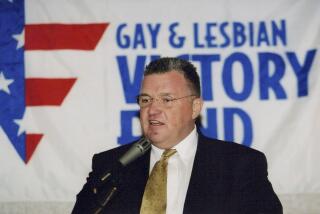Oswaldo Paya dies at 60; Cuban anti-Castro activist
Cuban activist Oswaldo Paya, who spent decades speaking out against the communist government of Fidel and Raul Castro and became one of the most powerful voices of dissent against their half-century rule, died Sunday in a car crash in Cuba. He was 60.
Paya and a Cuban man described by media as a fellow activist, Harold Cepero Escalante, died in an accident in La Gavina, just outside the eastern city of Bayamo, Cuban authorities said. A Spaniard and a Swede also riding in the car were injured.
Cuba’s International Press Center told the Associated Press that witnesses said the driver of the rental car lost control and struck a tree. Rosa Maria Paya, the dissident’s daughter, told CNN en Espanol that other witnesses said the car was run off the road by another vehicle. Police are investigating.
Paya, who drew strength from his Roman Catholic roots as he pressed for change in his homeland, continued to voice his opposition after Fidel Castro resigned due to illness in early 2008, calling the passing of the presidency to younger brother Raul a disappointment.
Paya became an activist in the late 1980s when he founded the non-governmental Christian Liberation Movement, which emphasized peaceful, civic action.
He gained international fame as the top organizer of the Varela Project, a signature-gathering drive asking authorities for a referendum on laws to guarantee civil rights such as freedom of speech and assembly.
Shortly before President Carter’s 2002 visit to Cuba, Paya delivered 11,020 signatures to the island’s parliament seeking that initiative. He later delivered a second batch of petitions with more than 14,000 signatures to the National Assembly, Cuba’s parliament, posing a renewed challenge to the island’s socialist system.
The Varela Project was seen as the biggest nonviolent campaign to change the system the elder Castro established after the 1959 Cuban revolution.
The government set aside the first batch of signatures and launched its own, successful petition drive to enshrine the island’s socialist system as “irrevocable” in the Cuban constitution.
Paya continued his efforts, saying it was more important to mobilize Cubans to demand human rights than to win government acceptance of the project. However, his influence waned notably in his final years as younger activists gained international headlines.
Paya and other longtime opposition figures were described disparagingly in leaked, confidential U.S. diplomatic cables as old, riven by petty rivalries and out of touch with the island’s youth.
Oswaldo Jose Paya Sardinas was born Feb. 29, 1952, the fifth of seven siblings in a Catholic family. An engineer by training, he was employed at a state enterprise that deals with surgical equipment.
Survivors include his wife and three children.
More to Read
Start your day right
Sign up for Essential California for the L.A. Times biggest news, features and recommendations in your inbox six days a week.
You may occasionally receive promotional content from the Los Angeles Times.






